There are many types of tea flavors available for your choosing. They are brewed differently and they offer varying health benefits.
Let’s look at some of the most common tea options.
1. White Tea
The Camellia sinensis plant’s young buds and leaves are utilized to make white tea, which then gets slightly processed to retain its mild flavor and scent.
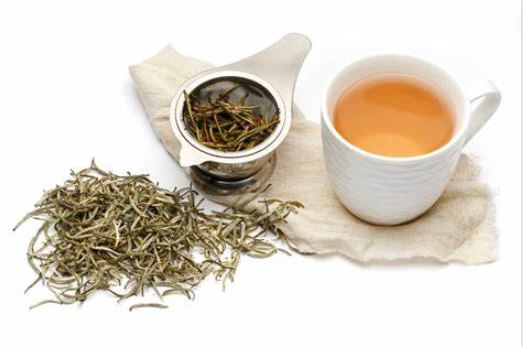
Ingredients:
- Water
- Camellia sinensis leaves
Health Benefits:
- Rich in antioxidants, white tea minimizes your likelihood of developing serious illnesses, prevents oxidative stress, and shields your skin from UV rays.
- Boosts the functioning of blood vessels and decreases cholesterol levels, helping to promote heart health.
- Improve metabolism while stimulating fat burning to assist in weight loss.
Precautions:
- Contains caffeine and thus can result in digestive problems or sleeplessness.
- Because of caffeine, those who are nursing or are pregnant must minimize their consumption.
- Consuming too much might trigger problems with bone density.
2. Green Tea
Water and Camellia sinensis leaves are brewed together to make the well-known beverage green tea. Its organic minerals and antioxidants are retained by minimal processing and oxidation hence its sweet scent, vibrant color, and taste.
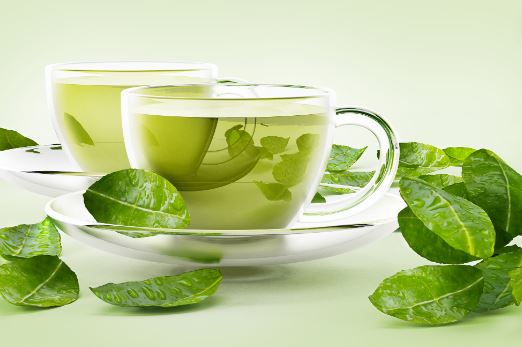
Ingredients:
- Water
- Leaves of Camellia sinensis.
Health Benefits:
- Enriched with antioxidants including catechins, green tea improves heart health, brain function, and metabolism.
- It can also assist in preventing cancer and reducing weight.
Precautions:
- Since it has caffeine, taking too much of it can lead to upset stomach or insomnia.
- Restrict consumption for women who are nursing or pregnant.
- In order to avoid blocking iron absorption, refrain from consuming green tea with meals containing high levels of iron.
3. Black Tea
Black tea is prepared using water and Camellia sinensis leaves that have undergone total oxidation, providing it with a rich color and a powerful flavor.
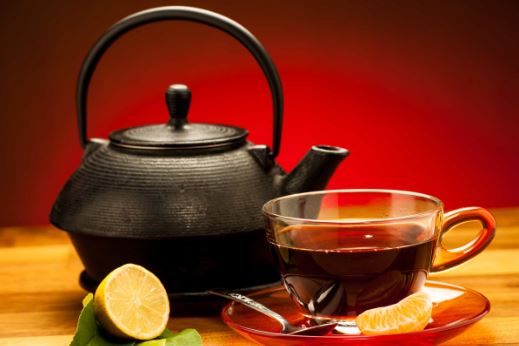
Ingredients:
- Water
- Leaves of Camellia sinensis.
Health Benefits:
- Full of antioxidants, black tea can strengthen immunity, help in digestion, boost heart health, and improve oral health.
Precautions:
- Minimize consumption in order to prevent adverse impacts from caffeine including digestive problems or drowsiness.
- Before consuming, women who are nursing or are expecting need to check with medical specialists.
- Kidney stones may develop as an outcome of excessive intake.
4. Peppermint Tea
Prepared with water and peppermint leaves (Mentha piperita), peppermint tea is a soothing herbal beverage. It’s a frequently used choice for relief from digestive problems and relaxation due to its unique taste and scent.
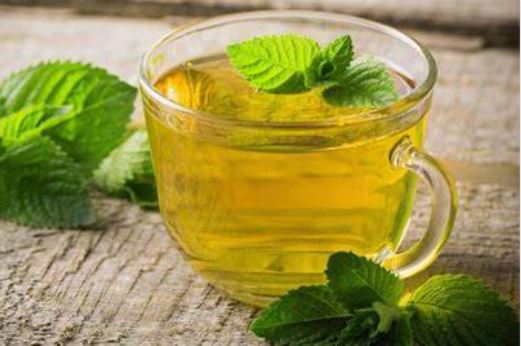
Ingredients:
- Water
- Peppermint (Mentha piperita) leaves.
Health Benefits:
- Antibacterial traits, headache relief, nausea relief, respiratory improvement, and enhanced digestion are all offered by peppermint tea.
- It’s commonly employed to calm unsettled stomachs and ease discomfort during digestion.
Precaution
- Although usually harmless, consuming too much of it can result in acid reflux or heartburn.
- Considering the chances of uterine relaxation, those who are nursing or are pregnant need to consume in moderation.
- Furthermore, peppermint tea must not be consumed by individuals allergic to mint.
5. Oolong Tea
Oolong tea is a conventional Chinese tea that features an intricate flavor profile that incorporates elements of black and green tea as a result of partial oxidation.
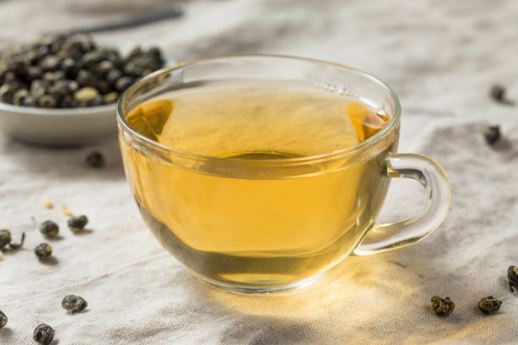
Ingredients:
- Water
- Camellia sinensis leaves.
Health Benefits:
- Known for its ability to boost mental alertness, help in managing one’s weight, enhance digestion, and improve heart health.
- It also increases metabolism.
Precaution:
- Has caffeine, which could contribute to gastrointestinal problems or insomnia.
- Because of the caffeine content, women who are nursing or are pregnant need to consume in moderation.
- Consuming too much might result in dehydration.
6. Chamomile Tea
Dried chamomile flowers (Matricaria chamomilla) soaked in hot water produce a relaxing herbal beverage referred to as chamomile tea. It is widely recognized for its relaxing characteristics and gentle, flowery scent, which renders it an ideal choice for calming and easing tension.
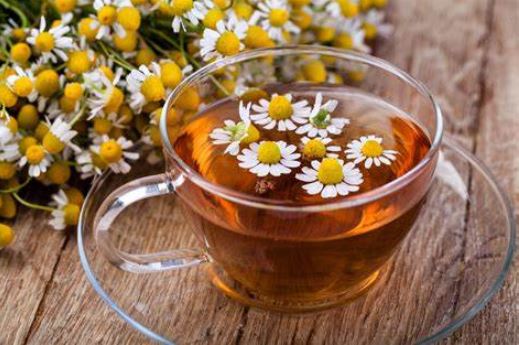
Ingredients:
- Water
- Chamomile flowers (Matricaria chamomilla).
Health Benefits:
- Chamomile tea assists in decreasing inflammation, improving digestion, and encouraging calm.
- It also helps in sleep, as well as offers antioxidant features.
Precautions:
- Those who are allergic to ragweed in particular might suffer adverse reactions.
- Given the likelihood of uterine stimulation, people who are nursing or are expecting are advised to consume in moderation.
7. Pu-erh Tea
Pu-erh tea is native to Yunnan, China, and gets improved in flavor and health benefits as time passes through a special fermentation process.
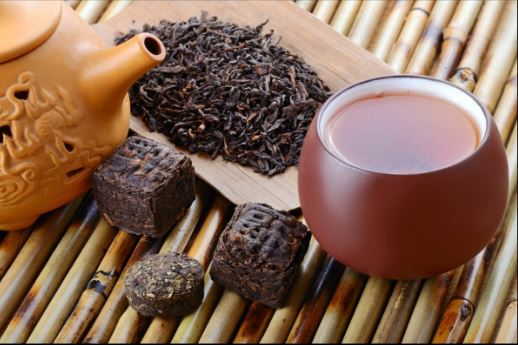
Ingredients:
- Water
- Camellia sinensis leaves
Health Benefits:
- This tea possesses antibacterial characteristics, assists in weight control, promotes digestion, and might reduce cholesterol.
Precautions:
- Since it’s high in caffeine, taking too much of it might lead to problems with digestion or restlessness.
- Moderate intake is recommended for people who are nursing or pregnant.
- Consuming excessive amounts can bring harm to the liver.
8. Yellow Tea
Yellow tea, a delicate varietal of tea originating from China, has a special characteristic of processing which consists of the moderate oxidation and fermentation process, yielding the tea a soft and sweet taste profile.
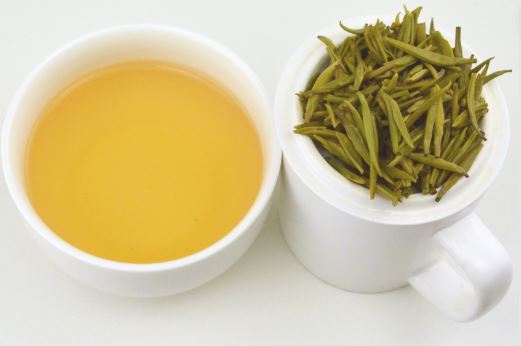
Ingredients:
- Camellia sinensis young leaves and buds
- Water
Health Benefits:
- There is a higher antioxidant content which enables this tea to maintain heart health, and also improve digestion and the immune system.
- It is a great alternative for people who get the bitter taste of green tea because it has a more silky taste.
Precautions:
- Yellow tea is a good drink for the majority of people just like it is coffee, however, watching those who are sensitive to caffeine is a must so that they can prevent overtaking the tea. Therefore, taking this drink moderately is recommended to prevent any unwanted effects like anxiety or sleeplessness.
- Before you can add yellow tea to the diet, women who are pregnant or breastfeeding have to consult their doctor.
9. Rooibos Tea
The leaves of the Aspalathus linearis plant, which is native to South Africa, are utilized for producing Rooibos tea, at times referred to as red bush tea. This herbal brew has no added caffeine. It is naturally sweet and spicy, and once brewed, eventually takes on a reddish-brown color.
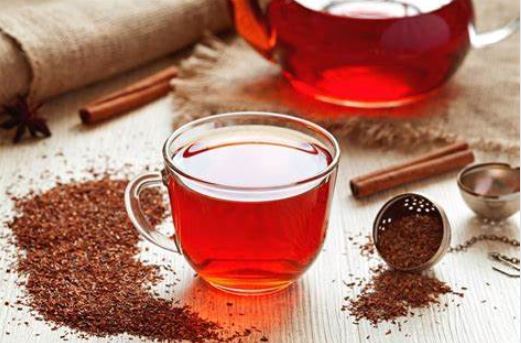
Ingredients:
- Water
- Rooibos leaves (Aspalathus linearis)
Health Benefits:
- Enriched with antioxidants, rooibos tea can assist with digestion, heart health, skin health, and symptoms of allergies.
- Since it has no caffeine, it is an excellent option for individuals who prefer a calming drink without the stimulating effects of caffeine.
Precautions:
- Although typically believed to be safe, allergic responses might develop in some people.
- Before consuming, women who are breastfeeding or pregnant need to consult with a healthcare provider.
10. Hibiscus Tea
Dried hibiscus blossoms (Hibiscus sabdariffa) combined with water form a vivid herbal infusion called hibiscus tea. It is popular for its intense reddish hue and strong flavor and is commonly consumed either cold or hot.
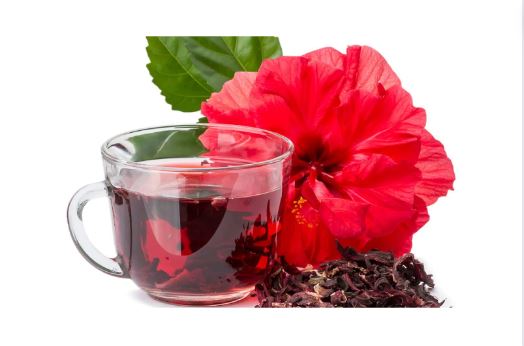
Ingredients:
- Water
- Dried hibiscus blossoms (Hibiscus sabdariffa)
Health Benefits:
- Filled with antioxidants, hibiscus tea reduces cholesterol and blood pressure, which can promote heart health.
- It can additionally promote liver function and contribute to weight management.
- Hibiscus tea also appears to possess antibacterial characteristics and might assist with minimizing inflammation.
Precautions:
- Aspirin and hypertension medications, among others, can react with hibiscus tea.
- Before consuming, persons who are pregnant or breastfeeding must check with a specialist because of prospective impacts on hormonal levels and contractions in the uterus.
11. Ginger Tea
Fresh ginger root is steeped in hot water producing a scented and soothing beverage called ginger tea. Its flavor profile is hot with a hint of sweetness, rendering it an appealing option for its relaxing and energizing properties.
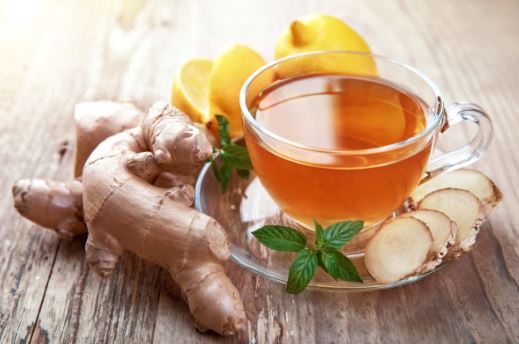
Ingredients:
- Fresh ginger root
- Water
Health Benefits:
- Decrease bloating, nausea, and gastric.
- Minimizes the symptoms of arthritis while lowering inflammation.
- Immune support: Enhances protection against infections and colds.
- Relieves migraines and cramps during menstruation.
- Antioxidant Properties: Improves general health and shields against cell damage.
Precautions:
- Moderation is vital since taking too much might result in upset stomachs.
- Ginger allergies can occur in some people.
- If you need to take blood-thinning medicines, check with medical professionals before taking ginger tea.
12. Jasmine Tea
Green tea leaves are mixed with jasmine blossoms to generate a sweet and flavorful brew referred to as jasmine tea. Known for its elegant floral scent and delicate taste, this standard Chinese tea offers a relaxing and rejuvenating drink.
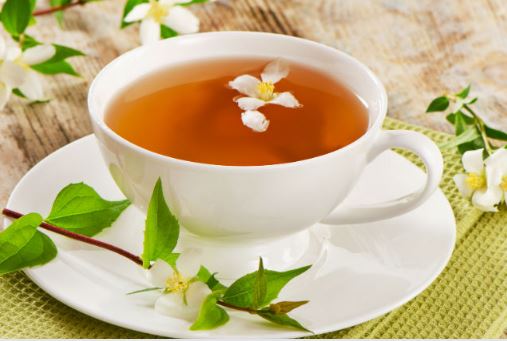
Ingredients:
- Water
- Jasmine flowers
- Leaves from green tea
Health Benefits:
- Packed with antioxidants, jasmine tea boosts heart health, enhances digestion, and strengthens the immune system.
- Furthermore, it may possess soothing qualities that alleviate anxiety and tension.
- Caffeine sensitivity needs to be controlled, however, as too much of it might result in restlessness or gastrointestinal issues.
Precautions:
- Considering that jasmine tea contains caffeine, breastfeeding mothers and pregnant women need to reduce the amount of their intake.
- On the other hand, this tea is unsuitable to be drunk by those who are allergic to jasmine blooms in order to prevent them from responding to allergic attacks.
13. LapsangSouchong Tea
Chinese black tea lapsang souchong is distinguished for its complex taste and fine smoke aroma. This unconventional method, however, makes its powdered tea taste like forests of pine trees and campfires.
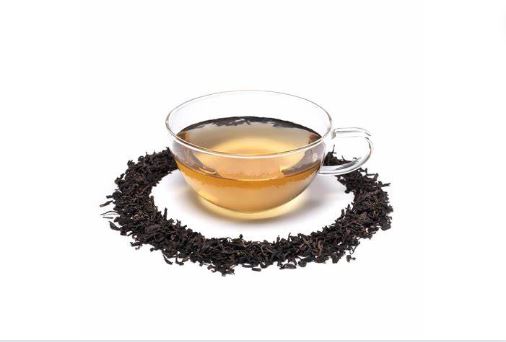
Ingredients:
- Camella sinensis leaves
- Water
Health Benefits:
- In Lapsang Souchong, oxidants are enriched and there is a possibility that digestion may improve, inflammation may lessen as well as heart health. The knowledge on this is still little.
Precautions:
- Since Lapsang Souchong contains caffeine, it is important to take it in moderation, especially, in the case of caffeine-sensitive people.
- In principle, limited consumption is advisable for women who are either breastfeeding or pregnant, and people with GERD would better avoid it as it usually intensifies symptoms.
14. Earl Grey Tea
Bergamot featured in Earl Grey tea gives the tea a unique flavor profile. Though it is a mixture of extreme delicacy and subtle aroma. Today, it is originally from England and its popularity captures the whole world due to its unusually strong aroma and clean taste.
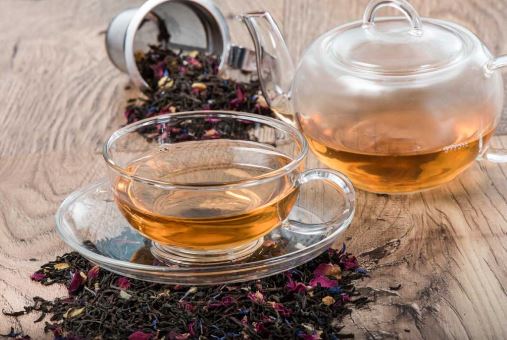
Ingredients:
- Black tea (Camellia sinensis) leaves
- Bergapten oil or extract
Health benefits:
- Earl Grey tea has a concentration of antioxidants that prevent heart diseases and may help smooth down the digestion process.
- Bergamot extract possesses a citrus aroma that can act as a mood improver and stress reliever.
Precautions:
- As Earl Grey tea is made of black tea leaves, which is known to contain caffeine, users who are sensitive to caffeine should regulate their dosage.
- Considering the amount of caffeine, mommies who are breastfeeding or expecting should try to minimize their intake.
- Additionally, it is possible for bergamot oil to counteract certain medications and may need consultation with a specialist.
15. Lemon Balm Tea
Melissa officinalis, the best-known plant with soothing effects and the fresh scent of lemon leaves is used to brew the common herbal infusion of lemon balm tea.
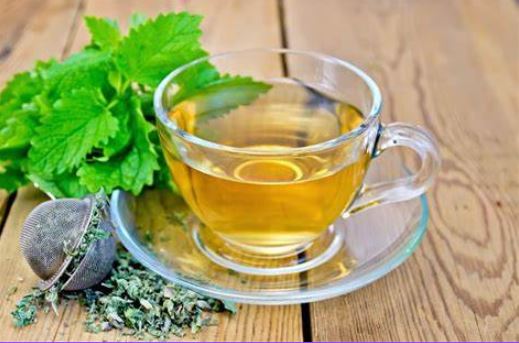
Ingredients:
- Leaves of Melissa officinalis
- Water
Health Benefits:
- Lemon balm tea aids digestion, reduces stress, relieves mood, and generally improves the quality of sleep.
- Flavonoids and rosmarinic acid, the components of the herb, possess anti-inflammatory and anti-oxidative properties.
Precautions:
- Even though they are usually safe, individuals sometimes develop minor reactions.
- Nursing women or pregnant women have to see their doctor to know if they should drink lemon balm tea because it can disrupt the hormone levels.
- Consumption of lemon balm can bring about drug interactions that can create negative side effects for people taking sedative drugs. Therefore, users of sedative drugs ought to know the implications.
16. Darjeeling Tea
Besides a superb aroma, flavor, and delicate pink shade, Darjeeling tea is a black tea blend grown in India’s Darjeeling district.
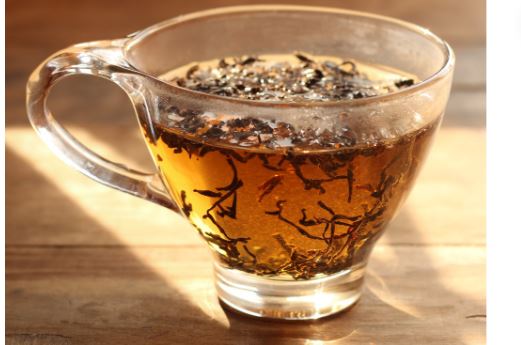
Ingredients:
- Water
- Camellia sinensis leaves
Health Benefits:
- The antioxidant content of Darjeeling tea helps the production of digestive enzymes, prevents cardiovascular and protects the brain against cognitive decline.
- It can even help to control weight and provide hydration.
Precautions:
- Darjeeling tea can be consumed in moderate amounts which is a general rule. On the other hand, this actually has caffeine in it, and drinking too much of it can result in the heart skipping beats, anxiety, and digestion issues.
- Pregnant or breastfeeding mothers should not take caffeine. They should limit caffeine consumption and check with the doctor.
17. Matcha Tea
Matcha is a highly refined powder that is made out of green tea leaves that grow in shade and is often utilized in Japanese tea festivals. It is commonly used as a drink as well as a food seasoning due to its unique taste and unmissable green color.
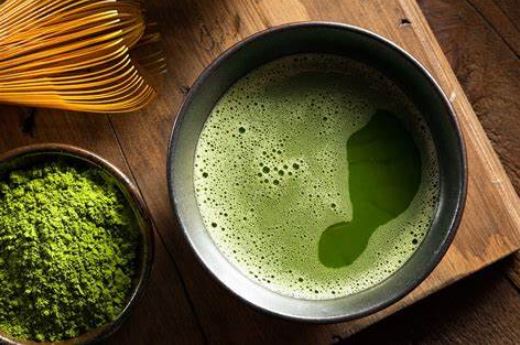
Ingredients:
- Water
- Camellia sinensis leaves
Health Benefits:
- With its high amounts of antioxidants, matcha tea provides immune boosting, better attention, digestion-regulating, and even cancer-preventing abilities.
- It is rich in chlorophyll which is responsible for body detoxification and has a positive impact in ensuring skin health.
Precautions:
- As it contains caffeine, it should be consumed in moderation, mostly for those who are caffeine-sensitive or who are pregnant or breastfeeding.
- Also, sometimes, taking too much can result in some people in a lack of sleep or stomach aches.
18. Yerba Mate Tea
Dried leaves from the Ilex paraguariensis plant are therefore used in the making of the traditional South American infusion called yerba mate tea. It has a long history and is culturally important, and people usually use it because of its unique taste and energetic characteristics.
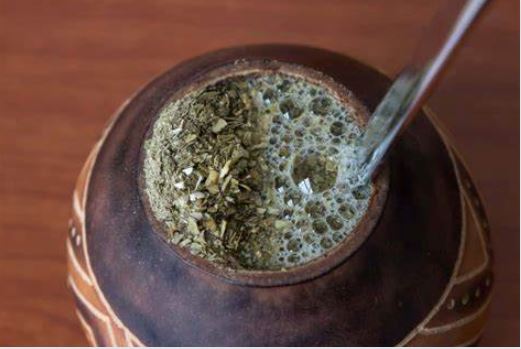
Ingredients:
- Llex paraguariensis extracted dried leaves and stems
- Water
Health Benefits:
- With minerals, vitamins, and antioxidants yerba mate tea assists you in being focused and clear, gives you a boost of energy, helps with your digestion, and may help you lose weight.
Precautions:
- High caffeine levels may lead to nervousness, drowsiness, and gastrointestinal discomfort.
- Women breastfeeding or pregnant should limit their intake.
19. Herbal Tea
Tisane, in other words, herbal tea, is a brew that includes flowers, herbs, fruit, and spices, that have no caffeine in them. It is a widespread choice for both health and well-being as it contains various aromas and flavors.
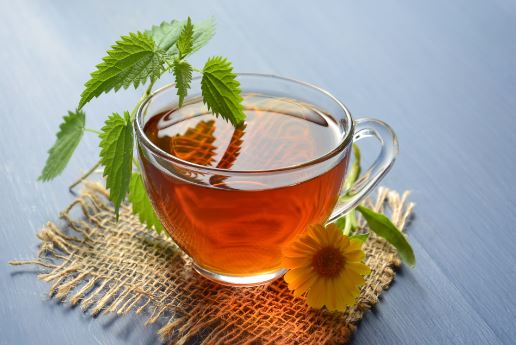
Ingredients:
- Herbs
- Flowers
- Fruits
- Spices
- Water
Health Benefits:
- Herbal teas are more immune boosters, digestion enhancers, relieving stress, and respiratory infections.
- They improve your overall health and are rich in antioxidants.
Precautions:
- The allergies might be possible in the products so look for them. Some herbs may be toxic. They can also interact negatively with drugs.
- Before consumption, anyone who is breastfeeding or pregnant must consult a doctor for confirmation.
20. Masala Chai
The most popular Indian classic flavored tea which has a strong taste is the masala chai famous for its spiced scents. Powerful black tea is blended with warming spices to produce an aromatic, rich beverage that is adored for its calming properties.
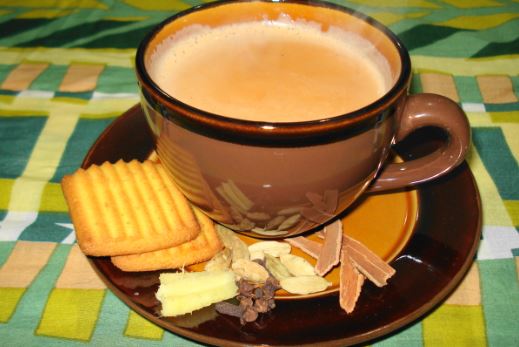
Ingredients
- Black tea leaves
- Water
- Milk
- Sugar
- Spices such as cardamom, cinnamon, ginger, cloves, and black pepper.
Health Benefits:
- Masala Chai supports digestion, a healthier immune system, reduces inflammation, and promotes active blood flow. Antioxidants and antibacterial contents are plenty in the spices used to make masala chai.
Precautions:
- Reduce consuming masala chai, if you have a sensitivity to peppery taste or caffeine.
- Please, before consuming, women who are breastfeeding or expectant, have to ask their doctor.
- Be careful if you are allergic to a particular spice.
21. Dark Tea
Black tea, generally known as post-fermented tea or tea fermented by using microorganisms, is a Chinese tea—fermented by microorganisms under natural conditions over a long period. This changes the taste of tea and brings about good health.
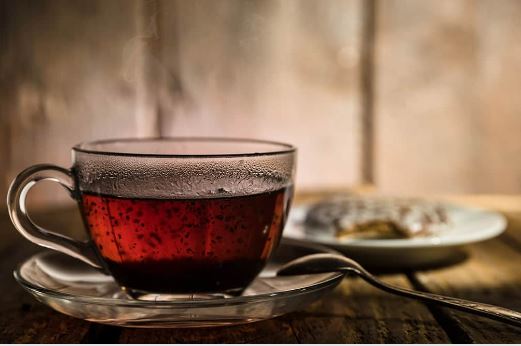
Ingredients
- Camellia sinensis leaves
- Water
Health Benefits:
- Loaded with antioxidants and probiotics, dark tea facilitates inflammation reduction, aids with weight loss, improves gut health, and ensures proper digestion.
- The theanine, also present, calms and improves mental sharpness
Precautions:
- As it is caffeinated, moderation is recommended, particularly for those who are caffeine-sensitive, pregnant, or lactating.
- Drinking too much can be the cause of restlessness or distress in the digestive system too.
22. Bubble Tea
Bubble tea, also known as pearl tea or milk tea, is indigenously famous in Taiwan. It consists of tea infused with flavors along with tapioca pearls on the top of it. As with the introduction in the 1980s it has swept the world for its fantastic smooth texture and taste.
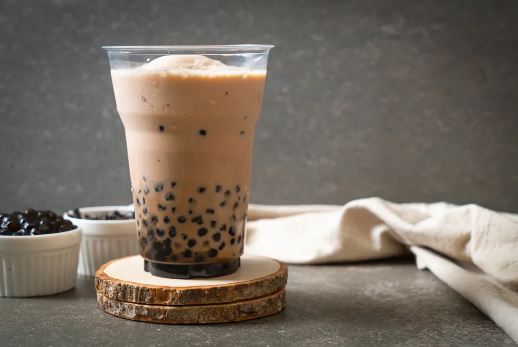
Ingredients:
- Tea,
- Milk
- Sugar
- Tapioca pearls.
Health Benefits:
- Consumption of bubble tea is also to admit that it hikes calorie and sugar content, but can be taken occasionally as a pleasure. At the same time, these drinks, if consumed in small amounts, can be satisfying and provide hydration.
Precautions:
- Users should take this drink in a limited amount. This is good because it prevents eating too many calories and health-related issues like tooth decay and excess weight because of sugar being too high level.
23. Iced Tea
It takes brewing the tea leaves and cooling the mixture by adding ice to make an iced tea. It’s chilled and normally contains fruit flavors or flavorants.
Ingredients:
- Tea
- Water
- Ice
- Lemon or mint(sweeteners)
Health Benefits:
- Iced tea keeps you hydrated, and less caloric, and its antioxidants aid with digestion.
- The teas with the iced green tea content are suitable for strengthening the heart and boosting metabolism.

Precautions:
- Although there may be sugar added to iced tea commercially prepared, overconsumption of this product might result in calorie consumption overdose and hence health complications such as tooth damage and obesity.
24. Thai Tea
Thai tea is a popular drink in Thailand which is made from tea, milk, and other sweet buttery flavors and possesses an orange hue and aroma. It is frequently consumed as a cold tea drink, often topped with ice.
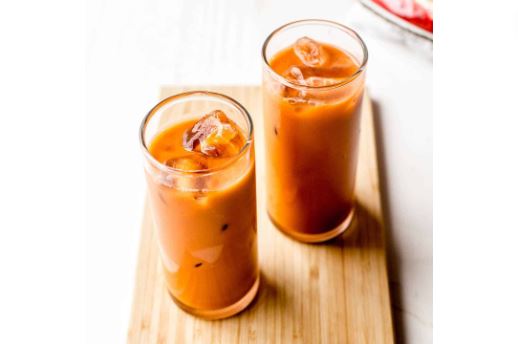
Ingredients
- Black tea leaves
- Sweetened condensed milk
- Evaporated milk
- Sugar
- Spices like cardamom
Health Benefits:
- Sweetened condensed milk is what makes Thai tea high in calories and sugar, to add to its exceptional taste. Nevertheless, black tea contains antioxidants and could be good for your heart and lower inflammation.
Precautions:
- With a lot of sugar in Thai tea, it should be taken in moderation, especially by those who are restricting sugar intake or treating health problems such as diabetes.
- This recipe contains dairy products, therefore, any individual who is allergic to lactose should use it with caution.
When it comes to tea packaging, you can trust JOCHAMP packaging machines. We offer a range of tea packaging solutions depending on your custom needs.


